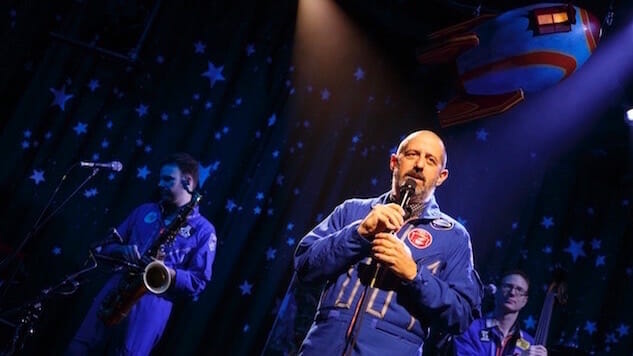Ethan Lipton on Creating The Outer Space
Joan Marcus
From March 8 through April 9, Joe’s Pub at the Public Theater is taking a trip into space with The Outer Space. Written by Ethan Lipton, this show combines both music and theatre to create a transcendent storytelling experience. Lipton and his fellow band members, Vito Dieterle, Eben Levy and Ian Riggs, tell a story about a couple who moves to space to “get away from it all” and the problems that follow. Paste chats with Ethan Lipton about creating The Outer Space and returning to the Public Theater.
Paste: Before The Outer Space, you also did another show about another planet—Mars [No Place to Go]. Why did you decide to write and sing about space again?
Ethan Lipton: It was something that I thought I would probably not do again, but it ended up feeling like the right place to set that show and talk about the experiences that are set there. Once again, it opened up a whole range of possibilities. No Place to Go is about a guy who doesn’t go to outer space. His job is being relocated there, so this show, The Outer Space, it’s not a sequel, but it’s a follow-up which imagines what kind of experience that character might have had if he had actually gone.
Paste:Outer Space focuses on a couple, and the wife wants to get “away from it all, meaning the city. How did you decide to revolve the show around the “grass is always greener” problem?
Ethan Lipton: Well, I knew some people who bought a spaceship, and it seemed like some of the experiences they had were pretty universal, just as far as wanting to figure out a way to live sustainably and grow together. The whole idea or importance of being at home physically and existentially, so that’s where it came from.
Paste: With how clear the picture the music in Outer Space paints, you don’t need a giant set to show the world of the story. What’s the process for crafting the lyrics and music?
Lipton:We’ve been playing together for 12 years. We would just songs and we would play them in front an audience. With No Place to Go, that was the first time I decided to combine the two forms, but in both cases, I write lyrics and melody first. I hear things in my head, so it comes out with the form. We always arrange the songs as a band that’s a very collaborative effort. With this show, this is the first time when each band member wrote some music pieces on their own and brought that to the table, but the text, that’s me. I collaborate a lot with my director, Leigh (Silverman), who gives me feedback as I’m working. Part of everyone’s job is to make sure the music is pushing the story forward, so everyone’s involved in that conversation.
Paste: How long has Outer Space been in the works?
Lipton: It started with a residency in the Kimmel Center in Philadelphia about 18 months ago. It was summer of 2015 and all four of us—the band members and I—went down there. I had nothing at that point—usually when you do a residency you come down with some material, but I was starting from scratch. I thought I might write a different kind of story. We all went down there together, which was great, because as a band, sometimes it’s hard to find time to do a deep dive into a project. A lot of times, we’re rehearsing for three hours there and two hours here, but being able to do a residency and really dig in, I could do some deep thinking about the first couple of songs before I even knew what the story was. They had some time to make some compositions. We weren’t sure what we would do with those yet, and then we emerged from that first residency with three songs and sketches for three more. I went back with some more songs and I started to write the narrative, then we just workshopped it from there. We did an early out-of-town run at the Kimmel Center in December for three nights, then it continued to change as we got to New York.
-

-

-

-

-

-

-

-

-

-

-

-

-

-

-

-

-

-

-

-

-

-

-

-

-

-

-

-

-

-

-

-

-

-

-

-

-

-

-

-








































